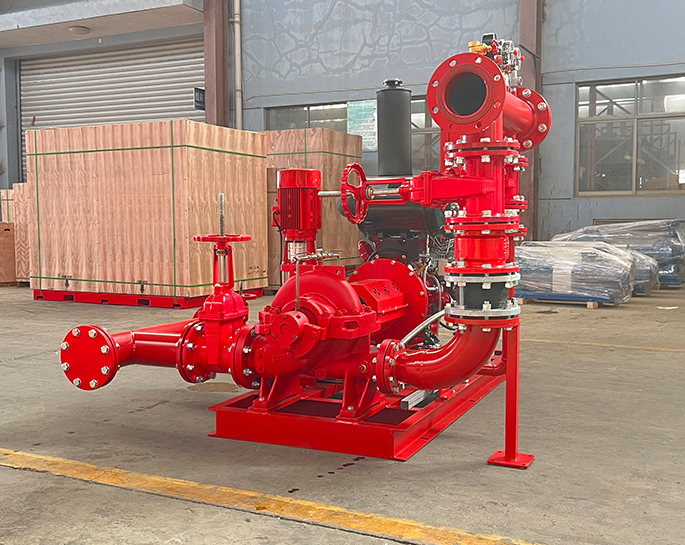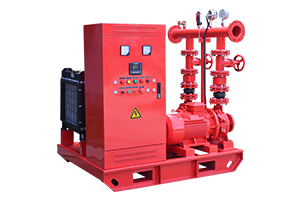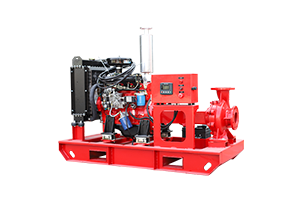How are fire pump systems affected by changes in water temperature, and what measures are taken to address these effects?
Jan 02, 2024
Share:
Fire pump systems can be affected by changes in water temperature, and it's crucial to understand and address these effects to ensure the reliable operation of the system. Here are some ways in which water temperature can impact fire pump systems and measures taken to address these effects:
1. **Viscosity Changes:**
- **Effect:** The viscosity of water changes with temperature. Cold water tends to be more viscous, which can affect the efficiency of the pump.
- **Measure:** Pump manufacturers often provide performance curves that indicate the pump's efficiency at different temperatures. Designers must consider these curves to ensure the pump operates effectively under various temperature conditions.
2. **Pump Seal Lubrication:**
- **Effect:** Seals in pumps rely on proper lubrication. In extremely cold temperatures, the lubrication may become less effective.
- **Measure:** It's essential to choose pumps with suitable seals for the expected temperature range. In some cases, heat tracing or insulation may be used to maintain a minimum operating temperature.
3. **Cavitation:**
- **Effect:** Cold water can increase the risk of cavitation, where low pressure leads to the formation of vapor bubbles, which collapse and cause damage to pump components.
- **Measure:** Adequate system design, including proper sizing of pipes and valves, can help prevent cavitation. Pump speed and impeller design are also important considerations.
4. **Freezing:**
- **Effect:** If water within the system freezes, it can damage pipes, valves, and the pump itself.
- **Measure:** Insulation and heat tracing are commonly used to prevent freezing. Additionally, in regions where freezing is a significant concern, dry-pipe or pre-action sprinkler systems may be employed to minimize the risk of frozen water.
5. **Material Compatibility:**
- **Effect:** Some pump materials may be sensitive to extreme temperatures, leading to premature wear or failure.
- **Measure:** Selecting pumps made of materials suitable for the expected temperature range is crucial. For example, using materials resistant to corrosion in cold climates is essential.
6. **Monitoring and Maintenance:**
- **Measure:** Regular monitoring of pump performance and maintenance checks, especially during extreme temperature conditions, can help identify potential issues early. This includes checking seals, lubrication systems, and ensuring that insulation and heat tracing are functioning correctly.
7. **Temperature Control Systems:**
- **Measure:** In some cases, temperature control systems, such as heaters or coolers, may be installed to maintain the water temperature within an optimal range for pump operation.
It's important to involve a qualified fire protection engineer in the design and selection of fire pump systems to ensure that the chosen components and measures are suitable for the specific environmental conditions where the system will be installed. Additionally, adherence to relevant codes and standards, such as NFPA 20 (Standard for the Installation of Stationary Pumps for Fire Protection), is crucial for the proper design and installation of fire pump systems.

1. **Viscosity Changes:**
- **Effect:** The viscosity of water changes with temperature. Cold water tends to be more viscous, which can affect the efficiency of the pump.
- **Measure:** Pump manufacturers often provide performance curves that indicate the pump's efficiency at different temperatures. Designers must consider these curves to ensure the pump operates effectively under various temperature conditions.
2. **Pump Seal Lubrication:**
- **Effect:** Seals in pumps rely on proper lubrication. In extremely cold temperatures, the lubrication may become less effective.
- **Measure:** It's essential to choose pumps with suitable seals for the expected temperature range. In some cases, heat tracing or insulation may be used to maintain a minimum operating temperature.
3. **Cavitation:**
- **Effect:** Cold water can increase the risk of cavitation, where low pressure leads to the formation of vapor bubbles, which collapse and cause damage to pump components.
- **Measure:** Adequate system design, including proper sizing of pipes and valves, can help prevent cavitation. Pump speed and impeller design are also important considerations.
4. **Freezing:**
- **Effect:** If water within the system freezes, it can damage pipes, valves, and the pump itself.
- **Measure:** Insulation and heat tracing are commonly used to prevent freezing. Additionally, in regions where freezing is a significant concern, dry-pipe or pre-action sprinkler systems may be employed to minimize the risk of frozen water.
5. **Material Compatibility:**
- **Effect:** Some pump materials may be sensitive to extreme temperatures, leading to premature wear or failure.
- **Measure:** Selecting pumps made of materials suitable for the expected temperature range is crucial. For example, using materials resistant to corrosion in cold climates is essential.
6. **Monitoring and Maintenance:**
- **Measure:** Regular monitoring of pump performance and maintenance checks, especially during extreme temperature conditions, can help identify potential issues early. This includes checking seals, lubrication systems, and ensuring that insulation and heat tracing are functioning correctly.
7. **Temperature Control Systems:**
- **Measure:** In some cases, temperature control systems, such as heaters or coolers, may be installed to maintain the water temperature within an optimal range for pump operation.
It's important to involve a qualified fire protection engineer in the design and selection of fire pump systems to ensure that the chosen components and measures are suitable for the specific environmental conditions where the system will be installed. Additionally, adherence to relevant codes and standards, such as NFPA 20 (Standard for the Installation of Stationary Pumps for Fire Protection), is crucial for the proper design and installation of fire pump systems.







